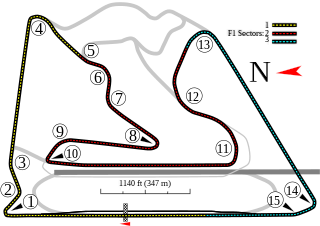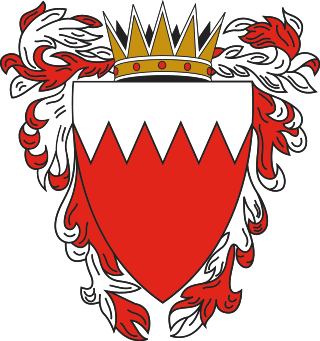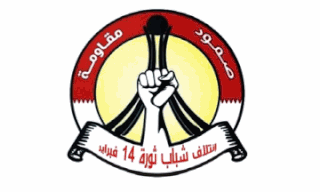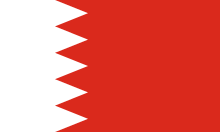Bahrain was a central location of the ancient Dilmun civilization. Bahrain's strategic location in the Persian Gulf has brought rule and influence from mostly the Persians, Sumerians, Assyrians, Babylonians, Portuguese, the Arabs, and the British.

The demographics of the population of Bahrain includes population density, ethnicity, education level, health of the populace, economic status, religious affiliations and other aspects of the population.

Hamad bin Isa bin Salman Al Khalifa is King of Bahrain since 14 February 2002, after ruling as Emir of Bahrain from 6 March 1999. He is the son of Isa bin Salman Al Khalifa, the previous and first emir. The country has been ruled by the Al Khalifa dynasty since 1783.

The Bahrain Grand Prix, officially known as the Gulf Air Bahrain Grand Prix for sponsorship reasons, is a Formula One motor racing event in Bahrain. The first race took place at the Bahrain International Circuit on 4 April 2004. It made history as the first Formula One Grand Prix to be held in the Middle East, and was given the award for the "Best Organised Grand Prix" by the FIA. The race has in the past been the second, third, or fourth race of the Formula One calendar. However, in the 2006 season, Bahrain swapped places with the traditional season opener, the Australian Grand Prix, which was pushed back to avoid a clash with the Commonwealth Games. Bahrain staged the opening race of the 2010 season and the cars drove the full 6.299 km (3.914 mi) "Endurance Circuit" to celebrate F1's 'diamond jubilee'. In 2021, the Bahrain Grand Prix was the season opener again because the 2021 Australian Grand Prix was cancelled due to the COVID-19 pandemic.

The Bahrain International Circuit is a 5.412 km (3.363 mi) motorsport venue opened in 2004 and used for drag racing, GP2 Series, and the annual Formula One Bahrain Grand Prix. The 2004 Grand Prix was the first held in the Middle East. Beginning in 2006, Australian V8 Supercars raced at the BIC, with the event known as the Desert 400. However, the V8 Supercars did not return for the 2011 V8 Supercar season. 24 Hour endurance races are also hosted at BIC. The circuit has a FIA Grade 1 license. The circuit also has multiple layouts.

The Bahrain national football team represents Bahrain in international football and is controlled by the Bahrain Football Association, which was founded in 1951 and joined FIFA in 1966. They have never reached the World Cup, but have twice come within one match of doing so. Bahrain won the FIFA's most improved team award in 2004, and finished fourth in the 2004 Asian Cup, beating Uzbekistan in the quarter-finals but losing to Japan in the semi-finals 4–3. Bahrain then lost to Iran in the third-place match, thus finishing in fourth place overall. Bahrain had a golden year in 2019, winning both the WAFF Championship and the Arabian Gulf Cup for the first time, under the stewardship of Hélio Sousa.

The House of Khalifa is the ruling family of the Kingdom of Bahrain. The Al Khalifas profess Sunni Islam and belong to the Anizah tribe. Some members of this tribe joined the Utub alliance which migrated from Najd in central Arabia to Kuwait, then ruled all of Qatar, more specifically Al Zubarah, which they built and ruled over before settling in Bahrain in the early 17th century. The current head of the family is King Hamad bin Isa Al Khalifa, who became the Emir of Bahrain in 1999 and proclaimed himself King of Bahrain in 2002, in fact becoming a constitutional monarch.
The Arabian Gulf Cup, often referred to simply as the Gulf Cup, is a biennial association football competition governed by the Arab Gulf Cup Football Federation for its eight member nations. The history of the competition has also seen it held every three to four years due to political or organisational problems. The reigning champions are Bahrain, who won their second title at the 26th edition.

The history of the Jews in Bahrain goes back to ancient times. Bahraini Jews constitute one of the world's smallest Jewish communities, although its origins go back to late antiquity. Talmudic sources refer to ports and islands on the Persian Gulf, indicating that Jews may have already settled in this region. Arabic sources record Jews in the old capital of Bahrain, Hajar, at the time of the Islamic conquest in 630 C.E. In the 12th century, the Jewish traveler-adventurer Benjamin of Tudela mentions 500 Jews living in Qays, and 5,000 in Al-Qatîf, involved in pearl fishery. In the 19th century, there were Jewish merchants from Iraq, Persia, and India in Bahrain.
Bahrain has been connected to the internet since 1995, and made it readily available to its citizens. The country's domain suffix is '.bh'. A 2004 study showed a liberal filtering system is used in Bahrain, one which can be easily bypassed, however more recent events have shown more sophisticated and pervasive filtering. In January 2009, Bahrain has started blocking a vastly increased number of sites through the Information Affairs Authority (IAA). The new filtering has had a noticeable impact in internet access speeds for all traffic.

Riffa is the second-largest city in the Kingdom of Bahrain in terms of area. The city is divided into three parts: East Riffa, West Riffa and North Riffa. All three parts are located in the Southern Governorate.

Bahrain, officially the Kingdom of Bahrain, is an island country in West Asia. It is situated on the Persian Gulf, and comprises a small archipelago made up of 50 natural islands and an additional 33 artificial islands, centered on Bahrain Island which makes up around 83 percent of the country's landmass. Bahrain is situated between Qatar and the northeastern coast of Saudi Arabia, to which it is connected by the King Fahd Causeway. The population of Bahrain is 1,501,635 as of 14 May 2023, based on elaborations of the United Nations data, of whom 712,362 are Bahraini nationals. Bahrain spans some 760 square kilometres (290 sq mi), and is the third-smallest nation in Asia after the Maldives and Singapore. The capital and largest city is Manama.

The 2011Bahraini uprising was a series of anti-government protests in Bahrain led by the mainly Shia and some Sunni Bahraini opposition from 2011 until 2014. The protests were inspired by the unrest of the 2011 Arab Spring and protests in Tunisia and Egypt and escalated to daily clashes after the Bahraini government repressed the revolt with the support of the Gulf Cooperation Council and Peninsula Shield Force. The Bahraini protests were a series of demonstrations, amounting to a sustained campaign of non-violent civil disobedience and some violent resistance in the Persian Gulf country of Bahrain. As part of the revolutionary wave of protests in the Middle East and North Africa following the self-immolation of Mohamed Bouazizi in Tunisia, the Bahraini protests were initially aimed at achieving greater political freedom and equality for the 45% Shia population.

Nabeel Rajab is a Bahraini human rights activist and opposition figure. He is the president of the Bahrain Centre for Human Rights (BCHR), a member of the Advisory Committee of Human Rights Watch's Middle East Division, deputy secretary general for the International Federation for Human Rights (FIDH), member of the Advisory Board of the Bahrain Rehabilitation and Anti-Violence Organization (BRAVO), co-founder of the Gulf Centre for Human Rights (GCHR), and former chairman of CARAM Asia.

The National Security Agency (NSA) or Bahrain Intelligence Agency (BIA1) is an investigative authority in Bahrain that is associated with but not formally part of the Ministry of the Interior. The NSA was formed after King Hamad issued Decree No. 14 of 2002 declaring it as the replacement of the General Directorate for State Security Investigations. The NSA was granted the power to make arrests by a 2008 royal decree, and lost this power in 2011, again by royal decree.

Ali Jawad al-Sheikh was a 14-year-old Bahraini who died in the hospital on 31 August 2011 after reportedly being hit in the head by a tear gas canister shot by Bahraini security forces during the Bahraini uprising. The Bahraini government denied security force involvement in his death and offered a reward for information on the incident. Activists, however, began a series of large protests after his funeral.

Coalition Youth of 14 Feb Revolution, sometimes called The Coalition is a Bahraini youth group, named after the date of the beginning of Bahrain's uprising, and led by anonymous individuals who organize protests chiefly via new-media sites. The Coalition first appeared on the popular pro-democracy forum Bahrain Online. Their Facebook page started in April 2011 where they have 65,282 likes. It is the main Facebook page that calls for daily peaceful demonstrations and protests. One of the first sub-groups called February 14 Youth was behind the call for demonstrations on February 14, 2011, named "Day of Rage" and developed later to a nationwide uprising. in 2017, the group has been designated as a terrorist organization by Bahrain, Saudi Arabia, United Arab Emirates and Egypt.

As of 15 March 2013, the Bahraini uprising of 2011 and its aftermath resulted in 122 deaths. The number of injuries is hard to determine due to government clamp-down on hospitals and medical personnel. The last accurate estimate for injuries is back to 16 March 2011 and sits at about 2708. The Bahrain Independent Commission of Inquiry concluded that many detainees were subjected to torture and other forms of physical and psychological abuse while in custody, five of whom returned dead bodies. The BICI report finds the government responsible for 20 deaths. Opposition activists say that the current number is 88 including 43 who allegedly died as a result of excessive use of tear gas.

Abdulredha Mohamed Hasan Buhmaid was a 28-year-old Bahraini protester shot by a live bullet in the head on 18 February 2011. He died in hospital three days later, the seventh death in the Bahraini uprising.

Bilateral relations exist between the countries of Bahrain and Iran. Since the 1979 Iranian Revolution, relations between the two countries have been strained over various geopolitical issues such as the interpretations of Islam, Awakening of the Islamic world, and relations with the United States, Europe, and other Western countries. In addition, Iran has been severely critical of Bahrain for hosting the United States Fifth Fleet within the Persian Gulf at the Naval Support Activity Bahrain base.

















